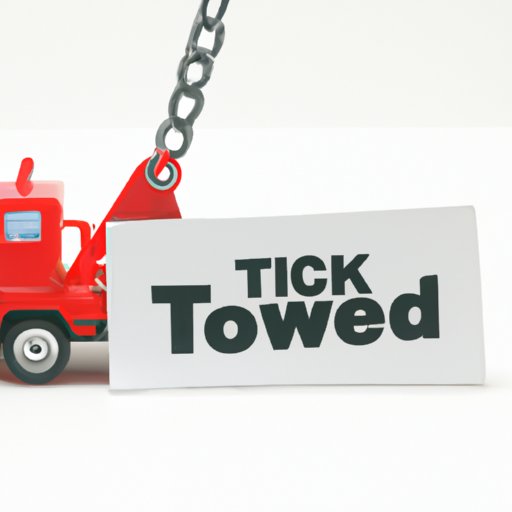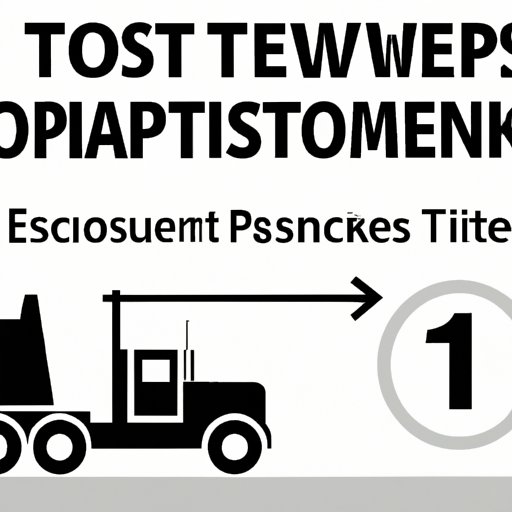
I. Introduction
Starting a tow truck business can be a profitable and rewarding venture for entrepreneurs who are passionate about helping others. A tow truck business provides a critical service to motorists who are stranded or need a vehicle transported. However, starting a business from scratch requires careful research, strategic planning, and a solid work ethic. In this guide, we will explore the seven essential steps to starting a profitable tow truck business, as well as in-depth information on establishing a successful towing business.

II. “7 Essential Steps to Starting a Profitable Tow Truck Business”
Starting a tow truck business requires thoughtful consideration and careful planning. Here are seven essential steps to help you launch a successful tow truck business:
A. Conduct Market Research
Before starting your business, you must research the local market for demand, competition, and pricing. Analyze the existing towing businesses in your area, their services, customer base, prices, and marketing strategies. Research the target audience and their specific needs. Determine what areas of the towing industry are underserved and how you can capitalize on these opportunities.
B. Choose a Location and Obtain the Necessary Permits and Licenses
As with any business, starting a tow truck business requires obtaining the necessary permits and licenses. Check with your local business licensing authorities to determine the requirements for operating a towing business. Depending on your location, permits and licensing may include a business license, a commercial driver’s license (CDL), tow truck permits, and liability insurance.
C. Acquire a Tow Truck and Other Equipment
The type of tow truck you choose depends on the services you plan to offer. Consider purchasing a flatbed or wheel lift truck, and ensure that your equipment is up to date and well-maintained. Stock your truck with essential supplies, such as chains, straps, and spare tires.
D. Develop a Pricing Strategy
Design a pricing strategy that is both reasonable for your customers and profitable for your business. Consider local market rates, factors that affect labor costs, and your break-even point to ensure that the fees you charge will support your business.
E. Develop a Marketing Strategy
Develop a marketing strategy to target your specific customers. Choose methods such as direct mail or social media to reach your desired audience. Devote time to networking with auto repair businesses, insurance companies, and roadside assistance operators, as they could be potential customers or referrals.
F. Hire Staff
You may need a team of qualified drivers to cover multiple routes and shifts. Consider hiring additional drivers or dispatchers to help manage your business and extend your coverage hours.
G. Set up a Website and Social Media Presence
The internet is a powerful tool for marketing your business. Set up a professional website so that customers can easily find your business, understand your services, and book appointments. Establish a social media presence to connect with customers, build your brand image, and provide quick customer service.
III. “The Ultimate Guide to Starting Your Own Tow Truck Business”
While the seven essential steps are critical to creating a successful tow truck business, following these additional steps can help create a solid foundation for your company:
A. Determine the Type of Towing Services to Offer
Identify the towing services you plan to offer. Consider offering more than just towing, such as roadside assistance, lockout services, and jump-starts.
B. Identify Your Target Audience
Define your target market by looking at specific demographic factors such as age, gender, and income level, as well as geographic location and the types of services that are in demand in your area.
C. Develop a Business Plan
A comprehensive business plan is critical to getting your towing business off to a good start. Develop a mission statement, establish your growth goals, and create financial projections that are based on thorough research of the towing industry and your local market.
D. Establish a Budget
Develop a budget that accounts for all of your costs, including equipment, leasing, personnel, and other expenses. Account for both short- and long-term expenses to ensure the long-term sustainability of your business.
E. Secure Financing
Find financing options to cover the expenses of starting a tow truck business. Consider partnering with investors or applying for loans or grants through the Small Business Administration (SBA) or other organizations that offer support for small businesses.
F. Hire Staff
Consider hiring additional staff to manage your day-to-day operations. Experienced drivers and dispatchers will help keep your business thriving, and administrative staff can help with the more clerical aspects of your business.
G. Launch Your Business
Launch your business with a bang by hosting a local launch event to increase awareness of your services. Promote your business through social media and other local marketing methods, and establish your presence in the local market early through targeted advertising.
IV. “From Idea to Reality: How to Start Your Own Tow Truck Business”
The four essential steps to starting your tow truck business are:
A. Assess Your Personal and Financial Readiness
Starting your own business requires a heavy investment of time and money, and it is essential to understand your financial and personal goals before you start. Consider your financial goals, your risk tolerance level, and the amount of time you can commit to the business.
B. Identify Business Opportunities and Competition
Identify the different opportunities in the towing industry and the competition you will face. Research the specific services that your competitors offer and the rates they charge. Look for ways to stand out from the competition and create a unique selling point for your business.
C. Research and Select a Business Entity
Choose an entity, such as a corporation or LLC, for your business. Your choice of entity can affect liability, taxes, and financing options.
D. Apply for an Employer Identification Number (EIN)
Obtain an EIN from the Internal Revenue Service (IRS) to identify your business for tax purposes.
E. Develop a Business Plan
Create a comprehensive business plan that includes your goals, marketing strategies, services, and budget. Include financial projections based on market research and realistic pricing strategies.
F. Secure Financing
Obtain financing from sources such as investors, loans, or grants. Find a business lending program that can provide the necessary funds to start your business or expand your existing fleet.
G. Obtain Necessary Permits and Licenses
Obtain the necessary permits and licensing required for operating a tow truck business in your area.
V. “The Business of Towing: A Comprehensive Guide to Starting Your Own Company”
Starting a tow truck business requires thorough research, a well-planned strategy, and consistent execution. In addition to the seven essential steps previously mentioned, here are five other strategic steps towards successful towing entrepreneurship:
A. Conduct Market Research
Ensure that you have thoroughly researched your market and customers to identify target consumer segments and specific needs. Take into consideration the competition and the economic climate of the area where you plan to operate.
B. Develop Your Business Concept and Services
Define a mission statement for your business, and establish your long-term goals. Consider which services you want to provide and how you will differentiate yourself from your competition.
C. Create a Business Plan
Develop a thorough business plan to guide every aspect of your operations, including marketing, financials, and human resources. Work through each step of the business plan to identify potential weaknesses and areas of risk.
D. Establish a Budget
Develop a budget that is based on your business plan. Keep in mind that costs may include fuel, maintenance costs, wages, insurance, and legal fees.
E. Secure Financing
Explore financing options to obtain the capital needed to start your business. Consider angel investors, venture capitalists, and bank loans.
F. Choose a Location and Obtain Necessary Permits
Choose a strategic location for your business and secure the necessary permits from the state and local government agencies.
G. Hire and Train Staff
Set up a detailed training program to ensure that your drivers and staff are qualified, reliable, and customer-oriented.
VI. “Tow Truck Business Startup 101: Tips and Tricks for Success”
Starting a successful tow truck business can be a challenging process, but with a focused approach, sound strategy, and hard work, it is possible to thrive in this industry. Here are several tips and tricks for achieving success:
A. Understand the Importance of Customer Service
When starting a tow truck business, prioritize customer service to establish a loyal customer base and positive reputation in the market.
B. Develop a Strong Marketing Strategy
Develop a marketing strategy that targets your specific audience and demonstrates your unique competitive advantage.
C. Maintain Your Fleet and Equipment
Maintain your tow truck fleet regularly to ensure that they are reliable, safe and effective. Always ensure that all your equipment is up to date and complies with regulations and safety standards.
D. Build Strong Relationships with Referral Sources
Build relationships with auto repair shops, insurance companies, and other roadside assistance businesses to serve as reliable referral sources for your customers.
E. Manage Your Finances Carefully
Establish a solid financial plan that takes into account all your costs, including labor, insurance, machinery operation, and management. Monitor expenses regularly as you grow your business.
F. Create a Work-Life Balance Plan
Starting a tow truck business can be time-consuming and emotionally draining, so it’s important to create a work-life balance plan that includes time for family, hobbies, and personal pursuits.
G. Stay Up-To-Date with Industry Trends and Changes
Stay informed of industry trends, safety regulations, and technology updates through publications, blogs, and professional networks. Identify opportunities to leverage new technologies or services to grow your business.
VII. “Be Your Own Boss: How to Launch Your Own Tow Truck Business”
Starting a new business can be an exciting and challenging venture, it takes a significant time commitment and financial investment. Follow these steps for launching a tow truck business and be your own boss:
A. Assess Your Personal and Financial Readiness
Understand your personal and financial goals and evaluate your readiness to start your own business. Consider working with a SCORE mentor to evaluate your business concept and develop a plan.
B. Create a Business Plan
Develop a thorough business plan that includes your mission statement, financial projections, marketing strategy, and services. Include an analysis of the market and potential competitors.
C. Establish a Budget
Create a budget that includes all costs related to launching and growing your towing business.





